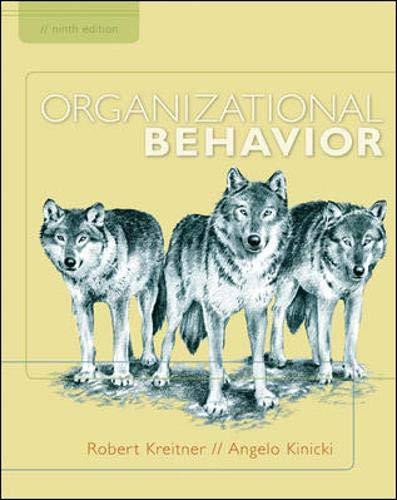Facing an important job interview, the college graduate searches her closet for the perfect outfit, then rifles
Question:
Facing an important job interview, the college graduate searches her closet for the perfect outfit, then rifles through her medicine cabinet for just the right cognitive-en hancement pill. Adderall, perhaps, to help her concentrate. Or Provigil, for alertness . . . or maybe a beta blocker to combat jitters?
Doctors in the U.S. who track drug trends say scenarios like this could play out in a thousand variations as 151 Web Resources For study material and exercises that apply to this chapter, visit our Web site, www.mhhe.com/kreitner college students who grew up using prescription drugs as study aids enter the workforce. Many high-powered professionals are already popping such pills in secret.
Within a few years they could be joined by millions of older adults, including baby boomers who decide there’s nothing wrong with using “smart drugs” to ward off senior moments. The drug industry will benefit mightily if public opinion swings this way.
Many healthy people have trepidations about tinkering with the brain using addictive or otherwise risky pharmaceuticals. But those reservations are eroding for several reasons. A whole generation has come of age using attention-deficit drugs such as Adderall and Ritalin, a category valued at nearly $4.7 billion in 2007. A lot of teenagers have used them casually as study aids, often buying them on the Internet. And now, overworked professionals are seeing the appeal.
“From assembly-line workers to surgeons, many different kinds of employee may benefit from enhancement and want access to it,” wrote Martha J. Farah, director of the Center for Cognitive Neuroscience at the University of Pennsylvania, in a recent commentary in the science journal Nature. In the controversial essay, she and her co-authors, including Stanford Law School Professor Henry T. Greely, declared it’s time for people to overcome their squeamishness: “Mentally competent adults should be able to engage in cognitive enhancement using drugs.
1. If they provide a competitive edge and are used by consenting adults, then it’s an acceptable business practice. Explain.
2. This is a dangerous game. Companies should have clear policies forbidding the use of these drugs (along with alcohol and illegal drugs) in the workplace. Explain.
3. This is a personal matter that could boost performance, so companies would be wise to passively accept it. Explain.
4. Invent other options. Discuss.
Step by Step Answer:






